UK Muslims mark Ramadan this month and food will, as ever, be central to the celebrations. Yet supermarkets are set to miss out. Why?
Like many British Muslims this week, Iman Lazram from south east London has been busy preparing for the start of Ramadan. In less than two weeks, the biggest event in the Muslim calendar kicks off, and as always, food is set to play a major part.
For despite fasting through the day, Lazram typically buys more, cooks more, and eats more during Ramadan than at any other time, she says, contributing towards the £200m that Ogilvy Islamic Marketing estimates British Muslims spend during the four-week period.
Not that supermarkets will see much of her money. As is typical, Lazram and her family prefer shopping in independent food shops during Ramadan “because we are trying to get all the things that are from back home”, she explains. “We are M&S fanatics in my household, but we don’t buy any halal food there.”
This should worry British supermarkets because Lazram is far from alone. A number of British Muslims have told The Grocer a similar story, pointing out that while Ramadan is the most important event in the Muslim calendar, supermarkets are yet to effectively acknowledge it. It is a solid month of feasting, parties and community by a population larger than Wales, and yet “retailers still haven’t got their heads around it,” says Shelina Janmohamed, vice president of Islamic marketing at Ogilvy Consulting.
The problem for supermarkets is that while they often now run dedicated Ramadan aisles and adverts, many Muslims feel their offerings are overly simplistic. And crucially, that’s the case all year round, not just during Ramadan. 63% of British Muslims feel supermarkets deploy outdated activations in store, according to a survey by Mud Orange, while 69% feel British supermarkets don’t understand them and their families.
The problems in many cases start with where halal and other Muslim-focused food is located – typically the ‘world food’ aisle – the flagship position for most ambient halal products.
What British Muslims think
80%
don’t feel supermarkets offer good value
90%
don’t feel supermarkets offer excitement
85%
want more Muslim-friendly Western Foods
63%
feel supermarkets use outdated messaging
69%
feel supermarkets and brands don’t understand them
Source: Takul consumer research, Mud Orange
This in itself raises a few problems, the first of which is the name. Will Walter, managing director of Halal convenience brand Takul, suggests ‘world foods’ should be changed to something like “‘faith-based’, or similar to become more relevant to the British shopper, while also allowing scope for other faiths too”.
It’s an oft-cited criticism, acknowledged even by Noor Ali, Asda’s world foods lead, who developed the term back in 2004. But, she says, while it may not be perfect, the ‘world foods’ concept has caught on with shoppers and retailers and “it at least has provided a destination within the store for customers to go to”.
The greater issue for many is what you find there. While ‘world food’ aisles have no doubt become more diverse in recent years, many British Muslims still feel the halal offering remains dominated by traditional south Asian cooking. “I think that feeling that it’s all bulk buy chopped tomatoes and samosas is something that is quite pervasive,” says Janmohamed.
For someone like Yusur Jabar, a British Muslim with Iraqi heritage, it can leave her feeling like there is nothing suited to her own heritage, often driving her to avoid supermarkets altogether.
“The supermarkets have never had that much of a range of halal products before so now we are just used to it,” she says, adding that being unable to get ingredients for core Iraqi dishes like vermicelli noodles has put her off supermarkets completely.
She adds that many ingredients, even when they are stocked in supermarkets, often don’t come in the necessary quantities. This means that she instead tends to go to an independent shop as “it is a good price for a lot”.
The mark-up on these ‘world foods’ can also be an issue. Basma Masri, a British Muslim with Lebanese heritage, says for her tahini is a “staple”, yet she would never buy it from a supermarket because in a local shop “it is a quarter of the price”.
Beyond world foods
But the issues encountered by British Muslims extend beyond just the world foods aisle. More and more people now want supermarkets to offer appropriate versions of alternative cuisines too, with 85% of British Muslims calling for halal versions of suitable western foods added to ranges.
At Asda, it is now recognised that “the kind of foods are changing, so it’s not just traditional curries any more” says Ali. Asda is evolving its range to reflect the fact that Muslims “shop right round the store” which is why the retailer added 150 new Ramadan lines across categories this year.
In many cases, though, the types of products supermarkets and manufacturers may adapt are not always obvious. Masri, for example, says her husband was “heartbroken” when he found out that tiramisus all contain alcohol, and are therefore not halal.
“The kind of foods are changing, so it’s not just traditional curries any more”
One man’s heartbreak is bad enough, but the issue around tiramisu reflects a more fundamental issue, says Iman, after echoing the call for an alcohol-free version of the Italian dessert.
“You just have to check everything you eat,” she says. “Meat is obvious: is it halal or not? But what about desserts? Does it have alcohol in it. With sweets, does it have gelatine in?”
Although she is now used to this situation in the UK, it’s still “a really nice feeling” not having to make these checks when visiting Islamic countries.
Often though, while diets are changing, current products “don’t represent who the British halal consumer is,” says Karama Khudairi, brand manager at Najma Foods, a halal convenience brand.
“If we are talking to the halal south Asian consumers, they say ‘well, we know how to cook a curry, we don’t need a curry flavoured thing,’” she explains. “We want to look and experiment with international flavours, which is where we come in with things like Thai green curry.”
“The days of just having kebabs and samosas are gone,” says Kaleem Ahmed, sales director at Dima Foods, a halal frozen food brand.
Ahmed hints at big moves to come in this space, with a potential deal with a frozen food giant to start producing halal pizzas, something he describes as “a very, very new product for halal categories” as previously the frozen and chilled aisles saw “very little from the bigger boys”.
There have been launches from smaller brands to reach this new category, however, including from Dima Foods itself. Takul, meanwhile, offers a range of halal products from spring rolls to enchiladas.
The need for a wider range of convenience products is felt by Jabar, who says she has often “looked at ready meals and just thought: ‘oh wow this would be so easy if I could just grab some of these,’” but instead must stick to veggie or vegan options. This means she often eats the same thing again and again.
As the demographic changes and “there is less of a reluctance to supplement the general cooking with ready food”, Janmohamed says, this desire will likely increase.
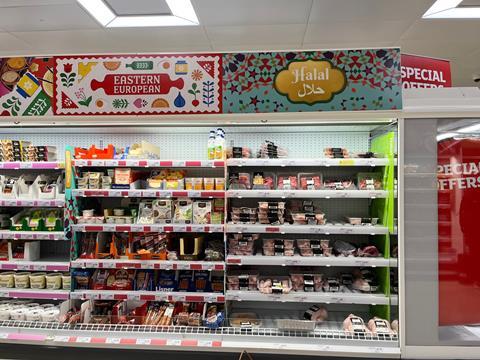
Meat
Despite an increased focus on value-added products, meat remains a core component of the British Muslim’s shopping basket. The Muslim shopper spent an average of £28.50 per week on meat in 2020, compared with just £12.50 in the general population, according to data from AHDB.
However, Jabar, Lazram and Masri all say they generally don’t buy meat from a supermarket. Part of this lack of engagement is down to trust, or lack thereof, something “we need to increase awareness around”, says Awal Fuseini, AHDB halal sector senior manager.
This is because there is no national standardised assurance scheme for halal products – and there is currently no plan to introduce one, Fuseini says. However, The Demonstration of Life assurance, supported by Defra, is a key scheme designed to assure consumers that the common slaughter method of stunning an animal with an electrical head-only stun is halal, as the animal is not killed in the process.
The other element, in Fuseini’s view, is that there are two different types of quality in the eyes of the Muslim consumer: conventional and spiritual.
“In terms of spiritual quality, they would definitely trust the independent butcher, the halal butcher, if you compare the mainstream butcher,” says Fuseini. “Now if you compare in conventional quality, colour, hygiene and other things, then it is likely that the mainstream retailers would be better compared to the independent retailers.”
Jabar says that for her there was a definite quality difference in meat depending on where it came from. This was particularly the case with lamb – core to a lot of Muslim diets, with 60% of the population consuming it once a week – which Jabar says she would only buy in a butcher.
Quality is becoming increasingly important for British Muslims, adds Dima’s Ahmed, as “they don’t mind spending a little more as long as the quality is there”, which is a “massive shift from the days gone where it used to be high volumes at low margins”.
Masri says there are “very good-quality [brands in supermarkets] but because they are pre-packed, it just doesn’t appeal to me. It doesn’t seem as fresh, even though it probably is”.
UK Muslim population
2001
1.6m
2011
2.7m
2019
3.4m
2050
13.0m
Source: ONS
The idea that butchers are higher quality comes in part from the knowledge and relationship shoppers have with consumers. “It’s nice to know that this butcher is really clean,” says Lazram, whose family travels to central London for a specific Algerian butcher they have gone to for many years. “You know it is guaranteed halal. The people that are serving you care about it being halal.”
Khudairi’s halal brand Najma is stocked by retailers, but she emphasises how much work has gone into making sure it is trusted. “Trust is the heart of everything we do within the halal industry: because we have a label, we have the assurance that we have done the work to get it to the standard that it is permissible in the religion,” she explains.
Getting more consumers through the doors of the supermarkets is down in part to this experience and giving the consumer “the sense that the retailer is for them, that they are included, that they are represented that they walk into store and they feel welcome,” says Janmohamed.
The retailers are trying to improve this in-store experience and Asda has implemented a big push around Ramadan (and Eid), with briefing packs for store colleagues so “they can understand it very quickly, and support the event and festival in their stores”, says Ali.
However, for older generations with habits formed for many years, it is going to take more than a friendly face and a basic understanding of Muslim festivities to get them to move away from community butchers and independent shops.
Hence why brands and retailers are, and should be, working to entice younger shoppers who “are expecting to buy everything under one roof and want to have value for money and that premium as well”, says Ahmed.
Basma agrees that the older generation “like their local shops and it is easy for them to get the things they need” but says there is an appetite for a one-stop shop. The current need to visit several outlets is “inconvenient”, especially with children in tow.
To capture the one-stop Muslim shopper means understanding who these consumers are and what they want: an experience that is truly inclusive and reflective not only of their families’ heritage, but the modern British world.
As Walter explains: “They just want quality, tasty halal food that can be ready in minutes and are hungry for new products and brands to serve their needs – this is where the opportunity lies for British supermarkets!”
By expanding product range, improving in-store experience, and bolstering trust credentials, the potential is there for retailers to get a slice of this lucrative market.







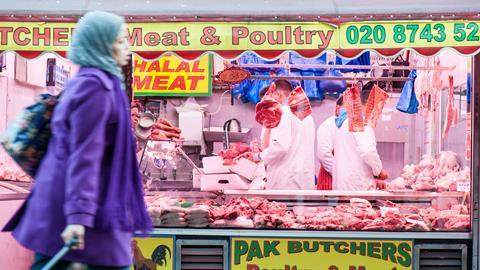
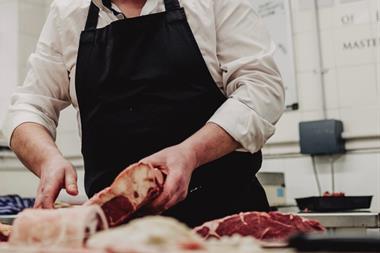
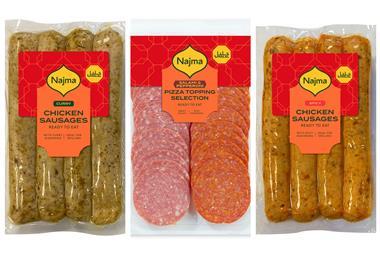


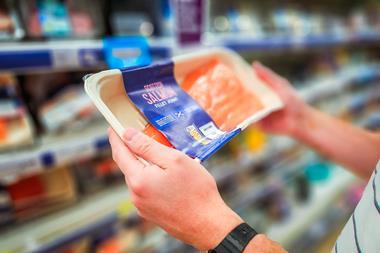







No comments yet